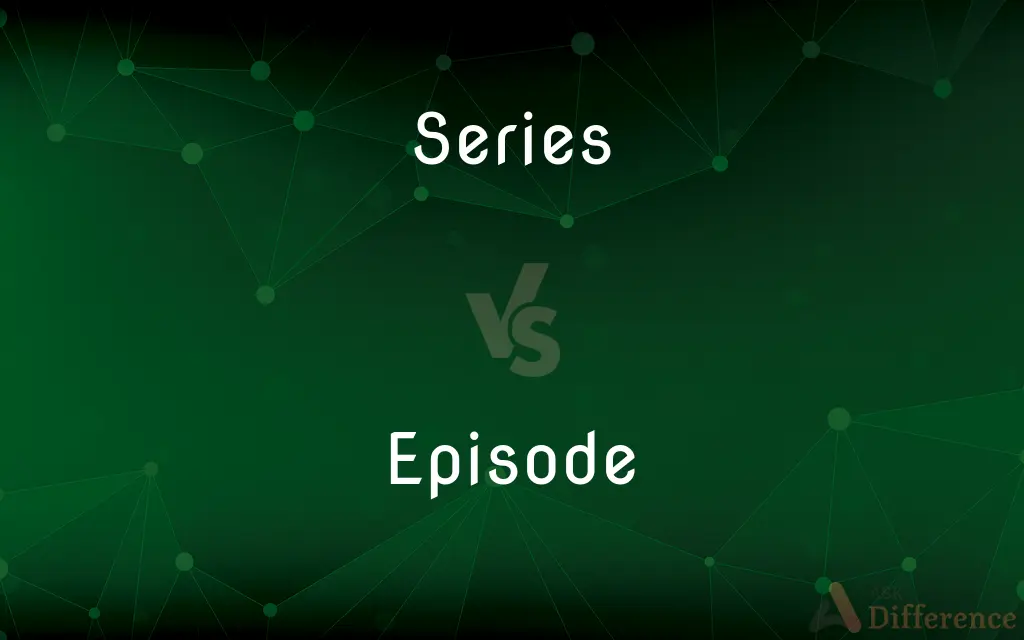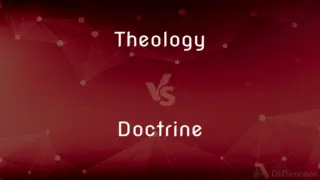Series vs. Episode — What's the Difference?
Edited by Tayyaba Rehman — By Urooj Arif — Updated on March 28, 2024
A series is a set of TV shows or episodes with a common theme or storyline, while an episode is a single installment within a series.

Difference Between Series and Episode
Table of Contents
ADVERTISEMENT
Key Differences
A series refers to a television or radio program that consists of multiple episodes, sharing a common theme, storyline, or characters. It is designed to be watched in a specific sequence to follow the plot or character development. On the other hand, an episode is one part or installment of a series, presenting a portion of the larger narrative. Each episode can vary in length but typically forms a segment of the overarching story or theme of the series.
While a series sets the stage for a broader storyline or thematic exploration, episodes offer individual narratives or chapters within that framework. A series might span multiple seasons, each containing numerous episodes, whereas an episode represents a single narrative unit within this structure. For example, a series like "Game of Thrones" encompasses several seasons, each made up of episodes that contribute to the larger narrative.
The creation and production of a series involve planning the storyline across multiple episodes, often with a defined beginning, middle, and end. Episodes, however, are created to fit within the series' broader narrative, with each episode potentially focusing on different aspects of the story or different character arcs, while still contributing to the overall plot.
Viewership patterns also differ between the two; a series attracts and builds its audience over time, encouraging viewers to follow the story through its episodes. In contrast, an episode's appeal might depend on its specific content, guest stars, or how it fits into the series' larger narrative arc. This difference highlights how series and episodes are consumed and appreciated by audiences.
The format of a series versus an episode allows for varying depths of narrative exploration. A series provides a broad canvas for character development and complex plots, while episodes offer the opportunity to delve into specific events, themes, or character focuses within that broader context.
ADVERTISEMENT
Comparison Chart
Definition
A set of TV or radio shows with a common theme or storyline.
A single installment within a series.
Scope
Broad, encompassing multiple episodes.
Narrow, focusing on a specific narrative within the series.
Structure
Can span multiple seasons, each with several episodes.
Represents one narrative unit or story chapter.
Production
Involves planning a storyline across multiple episodes.
Created to fit within the broader narrative of the series.
Consumption
Viewers follow the story over time through multiple episodes.
Viewers watch individual narratives within the larger series.
Compare with Definitions
Series
Can span multiple seasons with a connected storyline.
The series was renewed for a third season, continuing the saga.
Episode
Varies in length, often designed to fit within an hour or half-hour slot.
The episode ran for a gripping 45 minutes.
Series
Engages viewers in long-term character and plot development.
Over the series, the protagonist evolved significantly.
Episode
A single installment of a series, presenting a part of the larger story.
The episode featured a crucial turning point in the storyline.
Series
Often has a defined start and end, planned across episodes.
The series concluded with a satisfying resolution to its complex narrative.
Episode
Can be serialized or episodic, depending on the series format.
In this episodic series, each episode presented a new case to solve.
Series
A collection of episodes under a common theme or narrative.
The series explored various aspects of medieval politics.
Episode
Offers specific content that can attract viewers to the series.
The episode's cliffhanger ending left viewers eager for more.
Series
Builds a narrative arc that encompasses many episodes.
The series' overarching mystery unfolded over several episodes.
Episode
May have a self-contained narrative but contributes to the series.
This episode focused on a secondary character's backstory.
Series
A number of objects or events arranged or coming one after the other in succession.
Episode
An episode is a narrative unit within a larger dramatic work or documentary production, such as a series intended for radio, television or on-line consumption. Episode derives from the Greek term (Ancient Greek: ἐπεισόδιον / epeisodion), meaning the material contained between two songs or odes in a Greek tragedy.
Series
A set of stamps, coins, or currency issued in a particular period.
Episode
A separate part of a serialized work, such as a novel or television series.
Series
Physics & Chemistry A group of objects related by linearly varying successive differences in form or configuration
A radioactive decay series.
The paraffin alkane series.
Episode
A section of a classic Greek tragedy that occurs between two choric songs.
Series
(Mathematics) The sum of a sequentially ordered finite or infinite set of terms.
Episode
An incident or event that is part of a progression or a larger sequence
"one brief, if distressing, episode in a life rich in adventures, challenges, sorrows and joys" (Elizabeth Speller).
Series
(Geology) A group of rock formations closely related in time of origin and distinct as a group from other formations.
Episode
One of a series of events in the course of a narrative or drama.
Series
(Grammar) A succession of coordinate elements in a sentence.
Episode
(Music) A passage between statements of a main subject or theme, as in a rondo or fugue.
Series
A succession of publications that present an extended narrative, such as a comic book series, or that have similar subjects or similar formats, such as a series of cookbooks.
Episode
An incident, action, or time period standing out by itself, but more or less connected with a complete series of events.
It was a most embarrassing episode in my life.
Series
A succession of individual programs presented as parts of a unified whole, such as the set of episodes of a television show or a podcast.
Episode
An instalment of a drama told in parts, as in a TV series.
I can't wait till next week’s episode.
Series
(Sports) A number of games played by the same two teams, often in succession.
Episode
A separate incident, story, or action, introduced for the purpose of giving a greater variety to the events related; an incidental narrative, or digression, separable from the main subject, but naturally arising from it.
Series
(Baseball) The World Series.
Episode
A happening that is distinctive in a series of related events
Series
(Linguistics) A set of vowels or diphthongs related by ablaut, as in sing, sang, sung, and song.
Episode
A brief section of a literary or dramatic work that forms part of a connected series
Series
A number of things that follow on one after the other or are connected one after the other.
A series of seemingly inconsequential events led cumulatively to the fall of the company.
Episode
A part of a broadcast serial
Series
(broadcasting) A television or radio program which consists of several episodes that are broadcast in regular intervals
“Friends” was one of the most successful television series in recent years.
Episode
Film consisting of a succession of related shots that develop a given subject in a movie
Series
(mathematics) The sequence of partial sums of a given sequence ai.
The harmonic series has been much studied.
Series
A group of matches between two sides, with the aim being to win more matches than the opposition.
The Blue Jays are playing the Yankees in a four-game series.
Series
(zoology) An unranked taxon.
Series
(botany) A subdivision of a genus, a taxonomic rank below that of section (and subsection) but above that of species.
Series
(commerce) A parcel of rough diamonds of assorted qualities.
Series
(phonology) A set of consonants that share a particular phonetic or phonological feature.
Series
(electronics) Connected one after the other in a circuit, in series.
You have to connect the lights in series for them to work properly.
Series
A number of things or events standing or succeeding in order, and connected by a like relation; sequence; order; course; a succession of things; as, a continuous series of calamitous events.
During some years his life a series of triumphs.
Series
Any comprehensive group of animals or plants including several subordinate related groups.
Series
In Engler's system of plant classification, a group of families showing certain structural or morphological relationships. It corresponds to the cohort of some writers, and to the order of many modern systematists.
Series
An indefinite number of terms succeeding one another, each of which is derived from one or more of the preceding by a fixed law, called the law of the series; as, an arithmetical series; a geometrical series.
Series
A mode of arranging the separate parts of a circuit by connecting them successively end to end to form a single path for the current; - opposed to parallel. The parts so arranged are said to be in series.
Series
A parcel of rough diamonds of assorted qualities.
Series
Similar things placed in order or happening one after another;
They were investigating a series of bank robberies
Series
A serialized set of programs;
A comedy series
The Masterworks concert series
Series
A periodical that appears at scheduled times
Series
(sports) several contests played successively by the same teams;
The visiting team swept the series
Series
A group of postage stamps having a common theme or a group of coins or currency selected as a group for study or collection;
The Post Office issued a series commemorating famous American entertainers
His coin collection included the complete series of Indian-head pennies
Series
(mathematics) the sum of a finite or infinite sequence of expressions
Series
(electronics) connection of components in such a manner that current flows first through one and then through the other;
The voltage divider consisted of a series of fixed resistors
Common Curiosities
Can a series have multiple seasons?
Yes, a series can have multiple seasons, each consisting of several episodes that continue the storyline or theme.
How do series creators plan a storyline?
Series creators plan a storyline by mapping out the major plot points, character arcs, and thematic elements across the episodes and seasons.
How does an episode fit into a series?
An episode is a single installment of a series, contributing to the overall narrative or thematic exploration of the series.
Why do series have season finales?
Season finales conclude the current season's narrative arc, often with significant plot developments or cliffhangers to build anticipation for the next season.
Do series always follow a linear narrative?
Not always; some series employ non-linear storytelling, flashbacks, or alternative perspectives to enrich the narrative.
How do viewers watch a series?
Viewers can watch a series through traditional television broadcasts, streaming platforms, or purchasing digital/physical copies.
What is a TV series?
A TV series is a set of programs or episodes that are broadcast in a specific order, sharing common themes, characters, or storylines.
What determines the length of an episode?
The length of an episode can vary based on the series format and the network's scheduling, typically ranging from half an hour to an hour.
How important are episode titles?
Episode titles can hint at the episode's content, theme, or significance within the series' narrative.
Can an episode stand alone without the series?
While some episodes, especially in procedural series, can stand alone, they are generally designed to be part of the larger series narrative.
Can a series change its focus over time?
Yes, a series can evolve to introduce new themes, characters, or directions in its storyline across different seasons.
Can episodes have multiple parts?
Yes, some episodes are divided into multiple parts, especially for pivotal storylines or special events, and are often labeled as "Part 1," "Part 2," etc.
What is the difference between serialized and episodic series?
Serialized series have continuous stories across episodes, while episodic series feature standalone stories in each episode.
What makes an episode particularly memorable?
Memorable episodes often feature significant plot twists, character development, or emotional depth that resonates with viewers.
How does binge-watching affect the consumption of series and episodes?
Binge-watching allows viewers to consume an entire series or multiple episodes in a short period, potentially enhancing engagement with the narrative and characters.
Share Your Discovery

Previous Comparison
Beryl vs. Emerald
Next Comparison
Theology vs. DoctrineAuthor Spotlight
Written by
Urooj ArifUrooj is a skilled content writer at Ask Difference, known for her exceptional ability to simplify complex topics into engaging and informative content. With a passion for research and a flair for clear, concise writing, she consistently delivers articles that resonate with our diverse audience.
Edited by
Tayyaba RehmanTayyaba Rehman is a distinguished writer, currently serving as a primary contributor to askdifference.com. As a researcher in semantics and etymology, Tayyaba's passion for the complexity of languages and their distinctions has found a perfect home on the platform. Tayyaba delves into the intricacies of language, distinguishing between commonly confused words and phrases, thereby providing clarity for readers worldwide.
















































